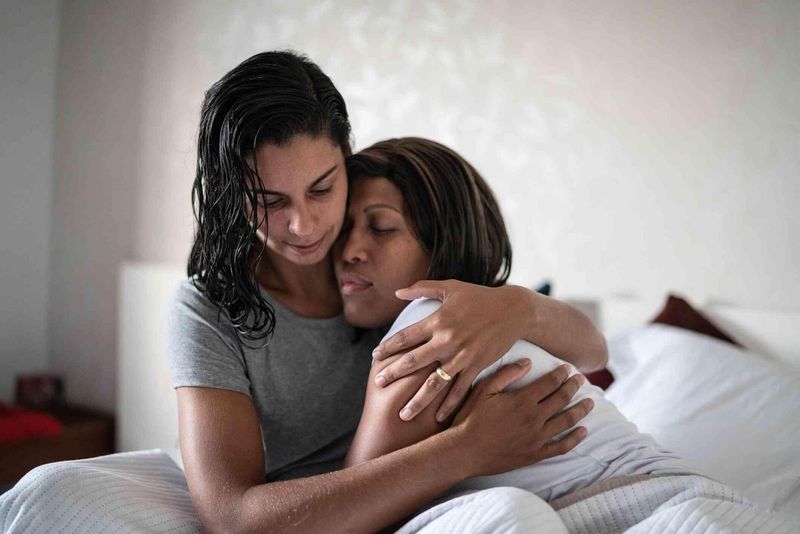17 Signs Your Partner Is Emotionally Draining You
You ever wake up, look at your phone, and already feel tired—like your relationship is another job you didn’t apply for? I’ve been there.
There’s a kind of exhaustion that creeps in, not from work or parenting or deadlines, but from loving someone who doesn’t know how to stop taking. It’s the slow burn of feeling like you’re holding everything together while your own needs keep slipping through the cracks. Nobody teaches you to spot emotional drain.
So, let’s get painfully honest: how do you know when the person you love is slowly wearing you out?
1. You Feel Responsible for Their Happiness

Ever feel like you’re carrying someone else’s mood on your shoulders? Like if they’re upset, it’s your job to fix it—even when you have nothing left in your own tank?
I remember sitting across the table, watching my coffee go cold, because I was too busy scanning his face for signs that I’d said the right thing. I thought if I could just make him laugh, or offer the perfect advice, maybe things would be okay. But every day felt heavier.
It’s wild how quickly you can forget what your own feelings even sound like. If you take on the impossible job of making sure your partner is never sad, anxious, or bored, you’ll run yourself ragged. No matter how hard you try, their happiness isn’t something you can deliver on demand.
That’s not love—that’s emotional labor, unpaid and endless.
2. You Dread Their Calls or Texts

You know that moment when your phone lights up, and your stomach sinks instead of fluttering? That’s not normal, no matter how much you try to justify it to yourself.
I used to jump at every message, craving the connection. But slowly, I started hoping he’d just go a day without needing something from me. When you’d rather your phone stay silent than risk another exhausting conversation, it’s a sign you’re tapped out.
It’s not about being a bad partner. It’s about self-preservation. If you’re relieved when they don’t call, ask yourself why. Sometimes, your gut knows what your heart isn’t ready to admit yet—you’re running on empty.
3. You’re Always the Therapist, Never the Patient

Imagine sitting through one more story about their bad day while you silently rehearse your own pain cause you know you won’t share it. That’s not partnership—that’s a one-sided therapy session you never signed up for.
I became brilliant at nodding, validating, and solving. But when I tried to bring up my own struggles, the conversation somehow boomeranged back to him. You start to wonder if your pain counts at all.
When you’re the go-to fixer but never the one being heard, the balance breaks. Healthy love is mutual. If you’re only ever listening and rarely listened to, you’re not a partner—you’re a support line, and it’s soul-sucking.
4. You Walk on Eggshells

You know the feeling—afraid to say the wrong thing, hesitant to show your true self. Every conversation feels like a careful negotiation, not a safe place to land.
I found myself second-guessing every joke, every confession, every sigh. Would this set him off? Was I too much, or not enough?
It’s not supposed to be like this. Love shouldn’t feel like a minefield. If you’re sacrificing your authenticity to avoid conflict or criticism, you shrink in your own life. That’s not just exhausting—it’s erasing.
5. Their Problems Always Take Center Stage

Once, I tried to tell him about my work win. Three sentences in, he’d turned it into a story about how his boss didn’t appreciate him. My moment disappeared.
There’s a difference between sharing and overshadowing. If your partner’s struggles, triumphs, and drama always drown out your own life, it’s not just inconsiderate—it’s draining. You start to feel invisible, like your stories don’t even matter.
The worst part? You start to believe it. If you’re always the audience, never the lead, your emotional tank will run dry fast.
6. You Feel Guilty for Wanting Space

Space isn’t a betrayal—it’s survival. But in some relationships, asking for an afternoon alone feels like a sin.
I’d make excuses just to get a few hours to myself. Even then, the guilt gnawed at me. What kind of partner needs to escape?
If you feel selfish for craving quiet or a night out with friends, something’s wrong. Your needs matter. Constant guilt over taking care of yourself is a flashing red light: you’re being emotionally smothered, not loved.
7. You’re Tired, But Not Physically

This isn’t the kind of tired you fix with a nap. It’s a bone-deep weariness that settles in even after a full night’s sleep.
I’d wake up with my body rested but my spirit heavy. Like I spent all my energy just surviving, not living.
Emotional exhaustion sneaks up on you. If you feel drained for no clear reason—if the joy leaks out of everyday moments—it might not be your job or your kids. It might be your relationship bleeding you dry.
8. You Avoid Sharing Your True Feelings

Remember when you could just blurt out the truth? Somewhere along the way, I started to hold everything back—fearful my feelings would be dismissed or spark another argument.
I’d swallow hard truths, bury frustrations, and smile through disappointment. Honesty felt risky, not freeing.
If you can’t show up as your real, messy self, what’s left? Love that costs your voice isn’t love; it’s survival mode. And that’s not sustainable for anyone, least of all you.
9. Your Needs Are Constantly Overlooked

Ever feel like you’re invisible in your own relationship? Like your wants, hopes, and even your basic comfort just don’t register?
I’d say I needed help or ask for a little kindness, and somehow, the conversation always shifted away. Sometimes it’s subtle—a forgotten errand, missed birthday, or just never asking how your day was.
It adds up. When your needs are always the afterthought, resentment builds. You start to wonder if you’re asking for too much. Spoiler: you’re not.
10. You Feel Trapped, Not Chosen

Love should feel like freedom, not a cage. But sometimes, you look up and realize you stay because leaving feels impossible.
I remember thinking, if I left, he’d fall apart—so I stayed, even when my own happiness vanished. Obligation replaced connection.
If you feel boxed in, more caretaker than companion, it’s a sign. Relationships are meant to be chosen, not endured. If it’s all duty and no desire, you’re not loved—you’re stuck.
11. Every Conversation Is Heavy

You ever crave talking about absolutely nothing? Instead, every chat turns into a therapy session or a fight about something you did wrong—even the smallest thing.
It’s exhausting. I missed dumb jokes and lightness, the easy banter that once made everything feel safe.
Relationships are meant to lift you, not bury you in constant tension. Some days, you just want the weather. If every exchange instead feels loaded, take it as a sign.
12. You Don’t Recognize Yourself Anymore

I looked at old photos and barely recognized the girl with the bright eyes. Somewhere, my spark faded. I started to feel like a shadow of myself—less fun, more anxious, always tired.
Loving someone shouldn’t cost you your sense of self. If you don’t laugh the way you used to, or if your hobbies gather dust, ask yourself why.
Losing yourself isn’t part of the deal and relationship shouldn’t write over your personality. It’s not partnership—it’s erasure.
13. You Make Excuses For Their Behavior

You know how you used to speak your mind? Now, you explain away every cold shoulder, late night, or mean comment.
I became an expert in smoothing things over. I told my friends, “He’s just stressed,” when deep down I knew it wasn’t the whole story. Defending him became a full-time job.
If you catch yourself justifying things you’d never accept from anyone else, pause. Sometimes we protect their image at the cost of our own reality. You deserve the truth!
14. You’re Relieved When They’re Not Around

The first time I realized I enjoyed his business trips more than his company, I knew something broke. Relief shouldn’t be your main feeling when your partner leaves the room.
You might tell yourself it’s just a phase, or you’re tired from work. But deep down, you know—solitude isn’t lonely, it’s a rescue.
If their absence feels like a vacation and their presence feels like pressure, that most definitely is not love. That’s emotional escape, plain and simple.
15. You Can’t Remember the Last Time You Felt Supported

Support shouldn’t be a distant memory. But at times, you realize it’s been months—or years—since you felt genuinely backed up by your partner.
I’d reach out for encouragement or even just a listening ear, but got indifference or distraction instead. It wears you down in ways you can’t explain.
When you face everything alone, even the best days feel smaller. A relationship without real support is just another heavy weight to drag around.
16. You’re Afraid to Set Boundaries

Boundary is not a dirty word, but it sure feels that way with the wrong person. I tried to ask for what I needed—a night off, a break from the drama—and the fallout was immediate.
Guilt trips, silent treatment, or anger followed. I learned to keep quiet, convinced my needs were too much.
If you’re scared to set limits or have to steel yourself before every honest conversation, you’re trapped in a cycle of appeasement. And it will drain you dry.
17. You Fantasize About Being Alone—And It’s Not Sad

Everyone needs a little time to themselves, but when you start picturing a life without your partner and it feels like hope—not heartbreak—that’s telling.
I’d catch myself planning weekends, holidays, even grocery runs, just me and silence. I found relief in the idea, not fear.
If solitude sounds better than another day together, listen to that. It’s your heart craving peace, not punishment. Maybe it’s time to answer.







